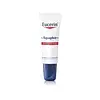What's inside
What's inside
 Key Ingredients
Key Ingredients

 Benefits
Benefits

 Concerns
Concerns

 Ingredients Side-by-side
Ingredients Side-by-side

Bis-Diglyceryl Polyacyladipate-2
EmollientJojoba Esters
EmollientHydrogenated Polyisobutene
EmollientRicinus Communis Seed Oil
MaskingDimer Dilinoleyl Dimer Dilinoleate
EmollientDiisostearyl Malate
EmollientOctyldodecanol
EmollientNylon-12
Helianthus Annuus Seed Wax
Skin ConditioningAroma
Silica Dimethyl Silylate
EmollientButyrospermum Parkii Butter
Skin ConditioningTheobroma Cacao Seed Butter
EmollientMentha Piperita Leaf Extract
Skin ConditioningHelianthus Annuus Seed Oil
EmollientCaprylic/Capric Triglyceride
MaskingAcacia Decurrens Flower Wax
EmollientStearalkonium Hectorite
Gel FormingPolyglycerin-3
HumectantPropylene Carbonate
SolventTocopherol
AntioxidantCitric Acid
BufferingLimonene
PerfumingMenthol 0.625%
MaskingCamphor 0.5%
MaskingAllantoin 0.5%
Skin ConditioningBis-Diglyceryl Polyacyladipate-2, Jojoba Esters, Hydrogenated Polyisobutene, Ricinus Communis Seed Oil, Dimer Dilinoleyl Dimer Dilinoleate, Diisostearyl Malate, Octyldodecanol, Nylon-12, Helianthus Annuus Seed Wax, Aroma, Silica Dimethyl Silylate, Butyrospermum Parkii Butter, Theobroma Cacao Seed Butter, Mentha Piperita Leaf Extract, Helianthus Annuus Seed Oil, Caprylic/Capric Triglyceride, Acacia Decurrens Flower Wax, Stearalkonium Hectorite, Polyglycerin-3, Propylene Carbonate, Tocopherol, Citric Acid, Limonene, Menthol 0.625%, Camphor 0.5%, Allantoin 0.5%
Octyldodecanol
EmollientC18-38 Alkyl Hydroxystearoyl Stearate
EmollientRicinus Communis Seed Oil
MaskingCaprylic/Capric Triglyceride
MaskingGlycerin
HumectantPanthenol
Skin ConditioningBis-Diglyceryl Polyacyladipate-2
EmollientWater
Skin ConditioningPolyglyceryl-3 Diisostearate
EmulsifyingButyrospermum Parkii Butter
Skin ConditioningHydrogenated Castor Oil
EmollientTocopherol
AntioxidantTocopheryl Acetate
AntioxidantSodium Ascorbyl Phosphate
AntioxidantCera Alba
EmollientBisabolol
MaskingC20-40 Alkyl Stearate
Skin ConditioningMagnesium Stearate
Cosmetic ColorantMagnesium Sulfate
Octyldodecanol, C18-38 Alkyl Hydroxystearoyl Stearate, Ricinus Communis Seed Oil, Caprylic/Capric Triglyceride, Glycerin, Panthenol, Bis-Diglyceryl Polyacyladipate-2, Water, Polyglyceryl-3 Diisostearate, Butyrospermum Parkii Butter, Hydrogenated Castor Oil, Tocopherol, Tocopheryl Acetate, Sodium Ascorbyl Phosphate, Cera Alba, Bisabolol, C20-40 Alkyl Stearate, Magnesium Stearate, Magnesium Sulfate
 Reviews
Reviews

Ingredients Explained
These ingredients are found in both products.
Ingredients higher up in an ingredient list are typically present in a larger amount.
This ingredient is lipid-based synthetic skin-conditioning agent derived from adipic acid and a mixture of fatty acids. It is often called a lanolin substitute.
As an emollient, it helps soften and hydrate the skin. Emollients create a barrier on the skin to trap moisture in.
Due to its fatty acid base, it may not be Malassezia folliculitis safe.
Learn more about Bis-Diglyceryl Polyacyladipate-2This ingredient is also known as shea butter. It is an effective skin hydrator and emollient.
Emollients help soothe and soften your skin. It does this by creating a protective film on your skin. This barrier helps trap moisture and keeps your skin hydrated. Emollients may be effective at treating dry or itchy skin.
Shea butter is rich in antioxidants. Antioxidants help fight free-radicals, or molecules that may harm the body. It is also full of fatty acids including stearic acid and linoleic acid. These acids help replenish the skin and keep skin moisturized.
While Shea Butter has an SPF rating of about 3-4, it is not a sunscreen replacement.
Shea butter may not be fungal acne safe. We recommend speaking with a professional if you have any concerns.
Learn more about Butyrospermum Parkii ButterThis ingredient is an emollient, solvent, and texture enhancer. It is considered a skin-softener by helping the skin prevent moisture loss.
It helps thicken a product's formula and makes it easier to spread by dissolving clumping compounds.
Caprylic Triglyceride is made by combining glycerin with coconut oil, forming a clear liquid.
While there is an assumption Caprylic Triglyceride can clog pores due to it being derived from coconut oil, there is no research supporting this.
Learn more about Caprylic/Capric TriglycerideOctyldodecanol is a fatty alcohol. It is primarily used to enhance the texture of products.
As an emulsifier, Octyldodecanol helps prevent the oils and waters from separating. It also prevents ingredients from creating foam when shaken.
Octyldodecanol is created by reducing fatty acid to an alcohol.
Due to its high molecular weight, it does not get absorbed into the skin.
Learn more about OctyldodecanolRicinus Communis Seed Oil is the INCI name for castor oil.
Castor Oil helps moisturize the skin. It is rich in a fatty acid called ricinoleic acid. This fatty acid helps prevent moisture loss on the skin. This helps keep your skin soft and hydrated. Ricinoleic acid also has anti-inflammatory and pain reducing properties.
Besides hydrating the skin, castor oil is also used to hydrate hair. By keeping the hair shaft moisturized, breakage is decreased. More studies are needed to show castor oil's effective on stimulating hair growth.
Castor oil is created by cold-pressing castor seeds and then purifying the oil with heat. It was used in Ancient Egypt as fuel in lamps and to help treat eye irritation.
The term 'fragrance' is not regulated in many countries. In many cases, it is up to the brand to define this term. For instance, many brands choose to label themselves as "fragrance-free" because they are not using synthetic fragrances. However, their products may still contain ingredients such as essential oils that are considered a fragrance.
Learn more about Ricinus Communis Seed OilTocopherol (also known as Vitamin E) is a common antioxidant used to help protect the skin from free-radicals and strengthen the skin barrier. It's also fat soluble - this means our skin is great at absorbing it.
Vitamin E also helps keep your natural skin lipids healthy. Your lipid skin barrier naturally consists of lipids, ceramides, and fatty acids. Vitamin E offers extra protection for your skin’s lipid barrier, keeping your skin healthy and nourished.
Another benefit is a bit of UV protection. Vitamin E helps reduce the damage caused by UVB rays. (It should not replace your sunscreen). Combining it with Vitamin C can decrease sunburned cells and hyperpigmentation after UV exposure.
You might have noticed Vitamin E + C often paired together. This is because it is great at stabilizing Vitamin C. Using the two together helps increase the effectiveness of both ingredients.
There are often claims that Vitamin E can reduce/prevent scarring, but these claims haven't been confirmed by scientific research.
Learn more about Tocopherol